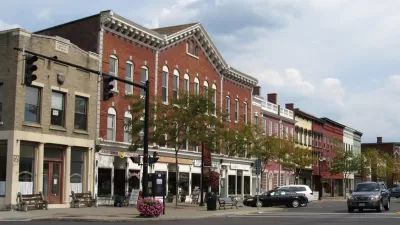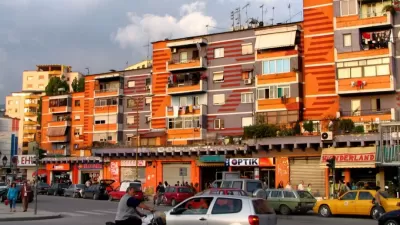Cities have appeared to figure very little into the presidential election up to now. To get a sense of whether this impression is accurate, I spent some time looking at the two party platforms, and the two candidate's websites.

A detailed look at Democratic and Republican party platforms and candidate websites shows that it’s quite true that cities are being ignore. However, the different ways in which cities don’t seem to matter much to either party sheds an interesting light on the candidates and the parties they do or do not lead. Yes, we all know that platforms are rhetoric, but rhetoric matters--the specifics may be disregarded by whomever wins the election, but the rhetoric sets the tone.
Predictably enough, the Republican platform is a 54-page angry, frustrated rant directed at President Obama, democrats, bureaucrats, big government, anything anyone on the right doesn’t like. It talks far more about rolling back than moving forward. The only reference to cities that I found in the entire document was a thinly veiled call to roll back D.C. home rule, calling on Congress to “assert, by whatever means necessary, its constitutional prerogatives regarding the District” (page 30), although one might add the platform’s denunciation of Obama’s “exclusively urban vision of dense housing and government transit […] meant to “coerce people out of their cars.” Had I but known.
Hillary’s website (interestingly, on her website she is “Hillary,” while on Trump’s website he is “Trump” or “Mr. Trump,” and never “Donald”) is far heavier on substance. She has detailed positions on 37--yes 37--separate issues from ending Alzheimer’s disease to addressing climate change. That’s a lot of issues, yet the only one that has anything to do with the places where Americans live is about “rural communities.” Nothing about cities, metros, regions, land use, housing. Nothing. And what about the Democratic platform? It’s a . . .
FULL STORY: Does Place Matter Anymore? Cities and the 2016 Election

Alabama: Trump Terminates Settlements for Black Communities Harmed By Raw Sewage
Trump deemed the landmark civil rights agreement “illegal DEI and environmental justice policy.”

Study: Maui’s Plan to Convert Vacation Rentals to Long-Term Housing Could Cause Nearly $1 Billion Economic Loss
The plan would reduce visitor accommodation by 25% resulting in 1,900 jobs lost.

Planetizen Federal Action Tracker
A weekly monitor of how Trump’s orders and actions are impacting planners and planning in America.

Waymo Gets Permission to Map SF’s Market Street
If allowed to operate on the traffic-restricted street, Waymo’s autonomous taxis would have a leg up over ride-hailing competitors — and counter the city’s efforts to grow bike and pedestrian on the thoroughfare.

Parklet Symposium Highlights the Success of Shared Spaces
Parklets got a boost during the Covid-19 pandemic, when the concept was translated to outdoor dining programs that offered restaurants a lifeline during the shutdown.

Federal Homelessness Agency Places Entire Staff on Leave
The U.S. Interagency Council on Homelessness is the only federal agency dedicated to preventing and ending homelessness.
Urban Design for Planners 1: Software Tools
This six-course series explores essential urban design concepts using open source software and equips planners with the tools they need to participate fully in the urban design process.
Planning for Universal Design
Learn the tools for implementing Universal Design in planning regulations.
Caltrans
Smith Gee Studio
Institute for Housing and Urban Development Studies (IHS)
City of Grandview
Harvard GSD Executive Education
Toledo-Lucas County Plan Commissions
Salt Lake City
NYU Wagner Graduate School of Public Service



























